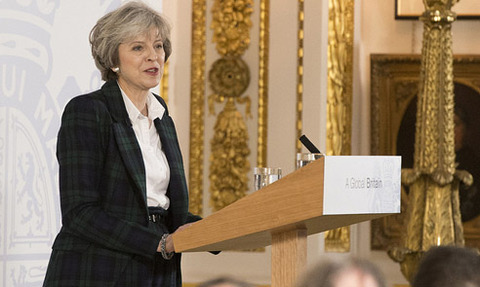Process industry leaders applaud May industrial plan
23 Jan 2017

Prime Minister Theresa May’s 10 point plan for an overhaul of industrial strategy with a focus on skills and infrastructure has received a strongly favourable response from key representatives of the process industries.
The prime minister’s promise of an “active” government approach implies a more interventionist policy than that of her predecessor David Cameron, with a green paper to set out the details.
Much of these draw on research and development initiatives highlighted in November and last week’s Plan for Britain, outlining the Government’s 12 priorities in her Brexit strategy.
While process industry responses have divided sharply on Downing Street’s recent announcement, there has been a degree of unanimity about the principles of the industrial strategy.
Terry Scuoler, CEO of manufacturers’ organisation the EEF, said:
“The right industrial strategy will provide the springboard for future British economic success. The fact that the PM has unveiled these plans herself suggests that this message too has successfully landed.”
The fact that the PM has unveiled these plans herself suggests that this message has successfully landed
Terry Scuoler, CEO, the EFF
Martin Walder, vice president of industry at energy management specialist, Schneider Electric welcomed the stance on the development of the Industrial Internet of Things (IIoT):
“We need the Government to drive capital investment in new manufacturing plant technology and equipment, such as robotics, automation and artificial intelligence.
“Research and innovation in these areas will have a direct impact on how new technology is rolled out, bringing with it the potential for significant gains in profitability, and the better management of safety, performance and environmental impact.”
Dr Colin Brown, Director of Engineering at the Institution of Mechanical Engineers, cautioned however that there was a need to ensure R&D creativity translated into commercial benefits.
“The UK has a great history of innovation, but UK companies have often struggle to bridge the investment barrier of commercialisation between development and bringing a product to market, he said.
“The new £4.7billion R&D fund must look to help companies overcome this ‘valley of death’ by supporting long term financial security.”
Skills development presented a further challenge, he said,with the emphasis on broad technical skills to develop an agile and resilient workforce rather than simply job-specific training.
“The UK urgently needs to raise its game in the development of a highly-skilled, technically-trained workforce to underpin our future economy, particularly in light of the UK’s withdrawal from the EU.
FDF director general Ian Wright, who has previously highlighted the effect on his sector of restrictions on EU migrant labour, said the issue would exacerbate the skills challenge.
“We face a looming demographic skills gap, heightened by the threat of losing our valued EU workforce. The emphasis the Government places on developing skills, particularly in STEM subjects and in the new technical colleges, is very welcome,” said Wright.
Meanwhile, the Nuclear Industry Council predicted that the industrial strategy would benefit from its involvement with the new nuclear programme. Both the development of small modular reactors (SMRs) technology and replacement of retiring power stations would provide opportunities for the supply chain across the UK.
Civil nuclear currently employs 65,000 people and generates 20% of electricity with no carbon emissions.

